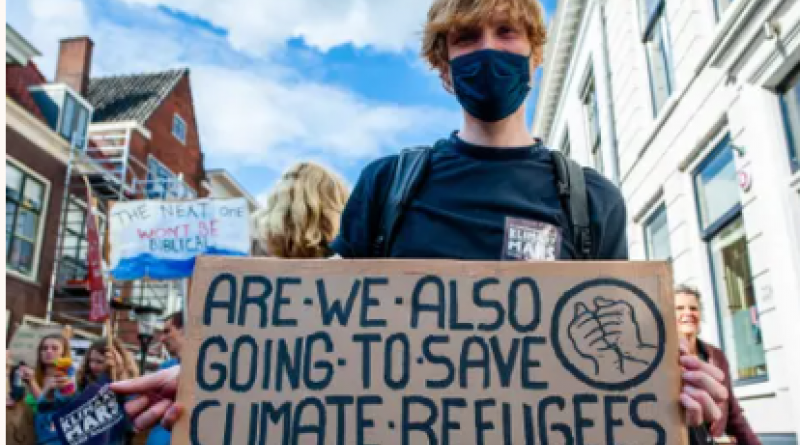Op - Failing to plan for climate refugees hands a cheap victory to the far right

The climate crisis could cause mass displacement as land is left uninhabitable – nations have to work together to plan for this.
As scientists wrestle to predict the true impact and legacy of Cop26, one speech, given at a rally organised by Global Justice Now, insisted upon a perspective not data-driven but moral. Lumumba Di-Aping, a South Sudanese diplomat and former chief negotiator for the G77, said: “The first resolution that should be agreed in Glasgow is for annex I polluters to grant the citizens of small island developing states the right to immigration.”
It was a tactful way of putting it: annex I nations are those with special financial responsibilities in tackling the climate crisis. They have these special responsibilities because their early industrialisation created so much of the carbon burden. A more pugilistic diplomat might have said “the people who created this disaster have to offer sanctuary to those displaced by it”, but then, he wouldn’t be a diplomat.
Di-Aping went on to note article 3 of the UN Universal Declaration of Human Rights: “Everyone has the right to life, liberty and security of person.” “Small island states,” he concluded, “should not be drowned alive like Zealandia.”
This is where what Greta Thunberg calls the “blah blah blah” of international treaty-making – its high-flown and occasionally inspiring rhetoric – meets reality. It is established, year after year, that no nation can fight climate change alone. Cooperation across the globe is summoned and celebrated, and it is often explicit, whether in imperialist-paternalistic terms (“those with the broadest shoulders must bear the most weight”) or liberal postcolonial ones (“those who made this mess must clear it up”), that such cooperation is not possible unless industrialised nations accept their responsibility towards industrialising ones.
Yet there is an enduring coyness and a lot of needless sophistry around the nature of that responsibility. The impact of the climate emergency will make human life impossible. Whether through floods, bushfires, unliveable temperatures, crop failures, all of the above or something unforeseen, the end result will be that swathes of land can no longer support human life. So the first and arguably only point of mutuality is, where are those displaced people going to live? Nations, in the end, can devise net-zero targets on their own. Cooperation may be helpful, from a trade or research perspective, in the development of new technologies, but only in the matter of climate refugees is it actually essential.
As old debates around the climate crisis and whether or not it is anthropogenic give way to consensus, new ambiguities and uncertainties are constructed around refugees: can they really be called the victims of environmental degradation? We will grapple with any other explanation – they’re actually economic migrants, or they’re the victims of civil strife, or they fell foul of a dictatorship, the one-bad-man theory of geopolitics – rather than trace these proximal causes back to their roots. Most political efforts, currently, are geared towards building a positive picture of a sustainable future; the alternative is despair or denial, neither of which are generative forces for change. A coherent, practical plan detailing the probable scale of displacement and figuring out a just distribution of the climate diaspora will look radical and unsettling.
One group is extremely comfortable on that territory, however: the far right. Steve Bannon sent a chill down the spine in 2015 when he talked about a “Camp of the Saints-type invasion into … Europe”. He made the reference again and again, until finally onlookers were forced to read the source: Jean Raspail’s racist novel of 1973, which one contemporary reviewer called “a major event … in much the same sense that Mein Kampf was a major event”. The title comes from a passage in the Book of Revelation about the coming apocalypse – civilisation collapses when the hordes arrive from the four corners of the Earth to “surround the camp of the saints and the beloved city” – and Raspail took up the idea; it was inevitable, he said, that “numberless disinherited people of the south would set sail one day for this opulent shore”.
Through Bannon and others, this idea has replicated, mutated and engulfed others, to become the “great replacement theory” of white supremacists, which Paul Mason describes in his recent book How to Stop Fascism as the toxic political view that “immigration constitutes a ‘genocide’ of the white race”. Feminists help it along by depressing the birth-rate, and cultural Marxists bring the mood music, by supporting both migrants and feminists.
Other far-right movements are sucked into the vortex of this wild but coherent theory, and yet more are spawned or shaped by it: the cosmic right (embodied in Jake Angeli, the QAnon figure in the animal-skin cap who stormed the Capitol in January, then went on hunger strike in prison because the food wasn’t organic), or the eco-minded white supremacists who make this explicit – you can be a humanitarian or an environmentalist. Choose one.
As fanciful and irrational as many far-right arguments are, they have a rat-like cunning. They find these spaces that are untenanted by mainstream debate – there will be climate refugees and they must be accommodated – and they run riot in them. Nations who ignore Lumumba Di-Aping aren’t doing anything to avert the consequences he describes: their silence merely creates an open goal for the professed enemies of a peaceful and prosperous future.
-
Zoe Williams is a Guardian columnist
11 November 2021
The Guardian





